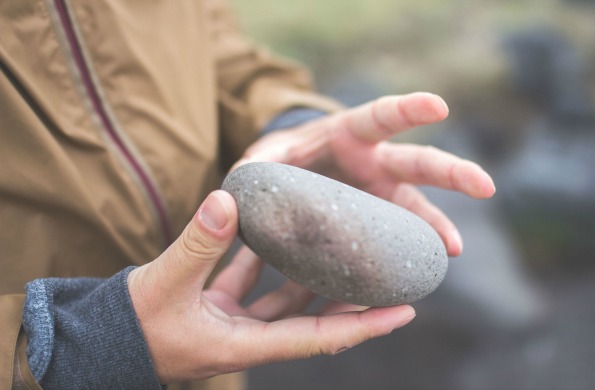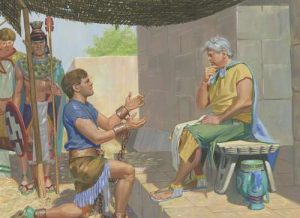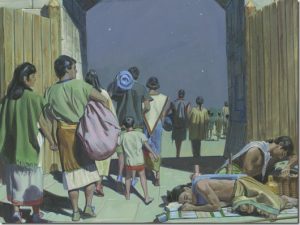As I am writing this, it is my 26th birthday. This birthday has gone about the same as my birthdays from the past four years since I returned from my mission. I always have what could be kindly termed “emotional distress,” but a more accurate term would be “complete mental breakdown.”
 On my 23rd birthday, I cried in the shower. Before I turned 24, I completely changed my hair. For my 25th birthday, I had a week-long breakdown complete with panic attacks. This year, I got super wound up about the fact that I am terrible at romantic relationships and flirting in general, so it’s business as usual. 26 is apparently not the year that I move past my issues and find peace where I am. But I got a new screen protector for my phone, so that counts for something, right?
On my 23rd birthday, I cried in the shower. Before I turned 24, I completely changed my hair. For my 25th birthday, I had a week-long breakdown complete with panic attacks. This year, I got super wound up about the fact that I am terrible at romantic relationships and flirting in general, so it’s business as usual. 26 is apparently not the year that I move past my issues and find peace where I am. But I got a new screen protector for my phone, so that counts for something, right?
I don’t tell you about my emotional instability so you can feel better about yourself in comparison. Well, maybe I do a little bit, but I hope that there’s someone out there who feels like, “Hey, I’ve been there too!”
Limhi, Lamanite Subjection, and Alma the Elder
I’ve been thinking about the story told in Mosiah about the two different peoples that came from Zeniff moving into the lands of the Lamanites. As a reminder, Alma and his followers left the people of Zeniff after King Noah sent his guards to kill all of them because Alma was preaching and baptizing near the waters of Mormon. Limhi was the son of King Noah and became king after Noah was killed by fire for being a bad dude. These two groups of people came from roughly the same background and had similar experiences, but what strikes me are the differences between their experiences.
Limhi and his people end up paying tribute to the Lamanites and it is generally an unpleasant experience for everyone involved. Limhi started looking for ways out of their situation and even sent some people out to look for Zarahemla. They found the remainders of the Jaredites and Coriantumr, but they didn’t find Zarahemla. Later, Ammon (the first Ammon, not “chops-off-people’s-arms” Ammon) and friends set out from Zarahemla trying to find the people of Zeniff, but they get arrested by Limhi’s guards because they’re worried that Ammon is out to kill Limhi.
Once he finds out that they’re from Zarahemla, Limhi is welcoming and excited that they’re there. Gideon comes up with this brilliant plan to get the Lamanite guards drunk so they can all sneak out the back. Limhi is like, “That’s an amazing plan! I’ll send some more alcohol so they get even more drunk.” It’s a great moment in the Book of Mormon and the amazing part is that a similar plan works again later in Alma, and the Lamanites don’t even see it coming. With the Lamanites passed out, the people of Limhi are able to leave their city and make their way to Zarahemla.
In contrast, Alma and his people run away from King Noah’s guards and then they’re hanging out in their new home when they are taken over by King Noah’s former priests who kidnapped the Lamanite daughters and were in general terrible people. Amulon, the main priest, decides that he wants to make life difficult for Alma and his people, so they’re forced to do hard labor and are banned from praying.
Amulon makes a lot of decisions that are meant to break Alma and his people. Instead, they pray that the Lord will make them more capable to bear up the burdens that they have to bear. They are in bondage and things are not going great when the Lord comes to Alma and tells him that He is going to cause all of the guards to be in a deep sleep so they can all leave the city and make their way to Zarahemla. They make it out and they end up in Zarahemla with the rest of the Nephites and the people of Limhi.
Circumstance Envy
I am certain that the two groups of people talked to each other about their experiences in captivity. They all had the end result of returning to faith in God and escaping captivity, but both groups got there through completely different circumstances. I’m sure that at least one person looked at the experiences of the other group and probably asked God, “Why couldn’t it have happened that way for me?”
As hard as we may try not to, we have all looked at the circumstances of another person and asked God, “Why couldn’t things happen in my life the way they happened in that person’s life?” That is a normal reaction to have and Heavenly Father understands why we feel that way. However, I think He wants us to learn to understand that we all need different things. Limhi and his people had a different path than Alma and his people. Both groups had different needs and different circumstances, and Heavenly Father understood and planned for that.
He does the same for us.
I spent a lot of time on my mission wondering why I had to have the companions I had. I often wondered, “Why can’t I have companions that I get along with, where we both have lots of fun and are super productive?” In essence, I was asking, “Why can’t I have what other people have?” While I was struggling with my companions, it was painful to look around and see other missionaries who were getting along like a house on fire and getting lots of work done. It wasn’t wrong for me to want those things, but I had to recognize that that was not my situation. I had to understand that while I wanted to have a companion who was awesome and nice, that was not what I needed at the time. I eventually had two wonderful companions who were everything that I needed after struggling through much of my mission with difficult companions. Being in that situation helped me realize that there is a big difference between what we want and what we need.
Wants vs. Needs
The difference between a want and a need is important for us to recognize. I love the Disney movie The Princess and the Frog because it teaches that difference simply. In the movie, Tiana (the protagonist) is an extremely hardworking woman focused on her dream of opening a restaurant. She gets turned into a frog when she kisses a talking frog (suspend your disbelief, people) who offers to help her get her restaurant. (Sidenote: while this movie teaches lessons about wants versus needs and that having people to love in your life is important, it also teaches that you shouldn’t make important life decisions when you are emotionally distraught.)
Tiana and the frog prince enlist the help of a jazz-playing gator and a Cajun firefly to get them to Mama Odie, a witch who lives in a tree on the bayou. Mama Odie tells them that while they want to be human, they must dig a little deeper to understand what they need. She wants them to recognize that they need each other and that when you have love–whether that’s romantic love, friendship love, or family love–everything else falls into place.
When we have experiences that we do not want or we see other people with experiences that we would rather have than our own, it can be difficult to remember that God gives us what we need. I was talking to a friend a few months ago about some of the difficulties she was having with school. I was reminded of my favorite part of the Sermon on the Mount. Jesus says:
7 ¶ Ask, and it shall be given you; seek, and ye shall find; knock, and it shall be opened unto you:
8 For every one that asketh receiveth; and he that seeketh findeth; and to him that knocketh it shall be opened.
9 Or what man is there of you, whom if his son ask bread, will he give him a stone?
10 Or if he ask a fish, will he give him a serpent?
11 If ye then, being evil, know how to give good gifts unto your children, how much more shall your Father which is in heaven give good things to them that ask him? (Matthew 7:7-11)
Heavenly Father is ready and willing to give us the things that He has prepared for us, and we have to remember that He is the giver of good gifts. When we receive things that are difficult, we may look at them and see a stone—then, when we look over at our friends with their loaves of bread, we get discouraged. Jesus taught that Heavenly Father will give us what we ask for, and that He will never give us something bad.
Comparison Creates Self-Loathing
Comparing what we have to others is never beneficial. Comparison is always going to hurt us. I am horrible about this. I am constantly comparing what I have to others around me. It makes me sad every time! It creates this spiral of sadness and self-hatred that is difficult to get out of. Whenever I start digging that pit for myself, I never feel that Heavenly Father is upset with me or looks at me and says, “Well, if you would just stop comparing yourself with other people, you wouldn’t be in this situation.” He has a lot of compassion for us when we find it difficult to accept the bread that He has offered us.
The reason I know He has compassion and patience is because of His words to the Saints in Doctrine and Covenants 58:
“Ye cannot behold with your natural eyes, for the present time, the design of your God concerning those things which shall come hereafter, and the glory which shall follow after much tribulation. For after much tribulation come the blessings. Wherefore the day cometh that ye shall be crowned with much glory; the hour is not yet, but is nigh at hand” (D&C 58:3-4, emphasis added).
He understands the circumstances in which we find ourselves, which is why He has given us what we need in the first place. He also understands that what we need can be difficult to take. He is always there to help us as we move forward with what we need to help us progress. Our Heavenly Parents are in the business of our eternal progression. The plan is designed for us to become like Them. Consequently, we are given what we need, not what we want.
Another pitfall of comparison is that we minimize our own feelings and difficulties. I trained a sweet missionary that was serious about being on a mission. She was there to work and she wanted to give every second she had to the Lord. Unfortunately, she had some health problems that got in the way of her desire to do that. She would get frustrated and would want to work when she was clearly not well. She would always tell me, “Jesus had it worse than I do.” I did not like hearing that from her. She used Jesus’ perfect life as a stick with which to beat herself because she fell short.
Finally I told her, “Jesus suffered everything that He did for you. He felt every sickness and every disappointment and frustration you have felt. He did it so He would know how to help you when you have to stay in bed because you’re throwing up or when your legs just won’t carry you anymore. He did it so He could carry you, not so you could make yourself feel bad for not being perfect.”
Christ Never Compares Us — So Why Do We?
The last thing that Jesus wants us to do is to look at Him and think that the Atonement isn’t for us because we don’t have it as bad as He did. Life is not a competition about who can suffer more, nor is it meant for us to shove our emotions deep down inside and hope they don’t all come spilling out once a year when we’re faced with the idea that it’s been a whole year and we’re still in the same place that we were in last year. Jesus sacrificed His perfect life for us so we could lean on Him and say, “I asked for bread but I’m pretty sure I got a stone. Help me carry this burden until I can see it as the bread I need.”
Recently I experienced another consequence of comparing myself to others. I had spiraled pretty hard on a Saturday night and then I got up for church the next day. I started spiraling again when I was waiting for sacrament meeting to start. Right as the opening hymn began, tears poured down my cheeks. My friend Rachel sat down by me and noticed that I was a complete mess and tried to ask me what was wrong and I couldn’t get the words out. I was embarrassed that I was crying in public and that I was crying over something that I felt was ridiculous. I was mad at myself for crying over something that a lot of other people struggle with, and I was sure that if I told Rachel why I was crying, she would think I was being ridiculous. I didn’t want to confide in her because I had compared our situations and believed that she would think I was being dramatic because she was in a similar place and doing just fine. Comparison is isolating.
I eventually confided in Rachel and instead of dismissing my feelings, she validated them. After talking to her, I felt seen. Our burdens become heavier if we insist on carrying them by ourselves. We can confide in Heavenly Father and we can confide in those around us. It’s easy to think that other people experiencing the same trial that we are will be dismissive—and some may be—when in reality, it’s the opposite. There is a lot of power in saying, “I’ve been in that hole. I know it can be hard, frustrating, sad, and lonely.”

To read more of Elisha’s articles, click here.
I suppose that this article has mostly been a letter to myself as a reminder that comparing myself and my circumstances to others will always leave me feeling empty. It is a reminder that what looks to me like a stone will eventually become the bread I need. Heavenly Father sees me in my circumstances, and that comforts me. He has never compared me to Beyonce, Eleanor Roosevelt, or Malala Yousafzai—and I shouldn’t either. I know that’s true for you, too.
“He is not waiting to love you until you have overcome your weaknesses and bad habits. He loves you today with a full understanding of your struggles…And God knows of your successes; though they may seem small to you, He acknowledges and cherishes each one of them,” (Dieter F. Uchtdorf, “Living the Gospel Joyful,” October 2014).
Heavenly Father knows all of the stones you’re trying to accept and see as bread because He gave them to you. He is the giver of good gifts and that includes the gifts that you need to reach your full potential.
About Elisha Ransom
Elisha Ransom is a Pacific Northwest native who recently graduated from Brigham Young University. Sight unseen, she moved to a 600-square foot apartment in Portland, OR to pursue a master's degree in urban planning. She is still trying to figure out a way to explain what urban planning is to people she talks to at parties.
Elisha served a mission for The Church of Jesus Christ of Latter-day Saints in Piura, Peru. Consequently, she has an affinity for Peruvian food and crowded public transit. In her spare time, Elisha enjoys watching the Great British Bake Off, eating tacos, and doing the New York Times crossword puzzle—these can be separate or combined activities.
Twitter •










